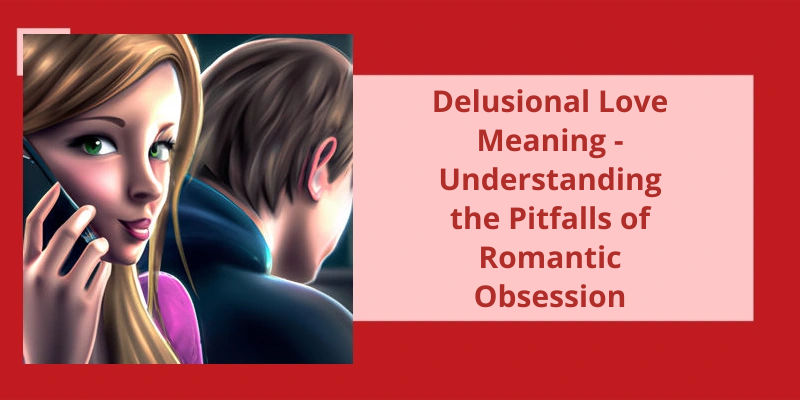Delusional love is a complex and often misunderstood psychological phenomenon that’s been the subject of much study and debate in the field of psychiatry. Erotomania, also known as de Clérambault's Syndrome, is a particularly extreme form of delusional love that’s characterized by an individual's belief that another person is in love with them. This delusion is often intense and all-consuming, with rejections interpreted as declarations of secret love. Unfortunately, these beliefs can lead to high-risk behavior such as stalking, making it a dangerous condition that requires professional help and understanding. Despite it’s rarity, the impact of delusional love on those who experience it can be profound, making it an area of research that demands further exploration.
Is Falling in Love Delusional?
For example, romantic love often involves an idealized view of the loved one, where we focus on their positive attributes while ignoring their negative ones. This can lead to disillusionment when we inevitably discover that they aren’t perfect. Additionally, the idea of finding one and only “soulmate” is delusional because it assumes that there’s one perfect person out there for us, when in fact there are likely many potential partners who could make us happy.
However, while the ideas associated with romantic love may not align with reality, the emotions and feelings that arise from it are very real. Falling in love can be a transformative experience that changes our perspective on life. It can inspire us to do things we never thought possible and bring out the best in us. Love has the power to give us a sense of purpose and make us feel truly alive.
Furthermore, love isn’t just limited to romantic relationships. We can also experience love with family, friends, and even pets. These connections can bring us just as much joy and fulfillment as a romantic partner. In fact, focusing solely on finding romantic love can be limiting and may cause us to miss out on all the other forms of love that are available to us.
Instead of getting caught up in the delusions of romantic love, it’s important to appreciate all the different forms of love that exist in our lives and allow ourselves to be open to the different experiences and connections that come our way.
Delusional disorders can have a wide range of causes, from neurological issues to mental health conditions. When it comes to relationships, being delusional about someone can have significant consequences on the individual’s well-being and the relationship itself. It can lead to heightened anxiety, mistrust, and isolation, making it challenging to establish healthy and meaningful connections with others. Thus, it’s essential to recognize the signs of delusional thinking and seek medical attention as soon as possible.
What Does It Mean When You Are Delusional About Someone?
When someone is delusional about another person, it means that they’ve formed beliefs and ideas about that individual that aren’t consistent with reality. This could include beliefs that the other person is in love with them, that they’re trying to harm them, or that they’re part of a larger conspiracy. These delusions can be persistent and difficult to shake, even in the face of evidence that contradicts them.
In some cases, it may be the result of a mental health disorder, such as schizophrenia or delusional disorder. In other cases, it may be related to underlying emotional issues, such as a past trauma or distrust of others. Regardless of the cause, delusions can have a significant impact on a persons life, causing them to feel isolated, fearful, and disconnected from the world around them.
One of the biggest challenges with delusions is that they can be difficult to recognize. People who’re suffering from delusions often believe that their beliefs are justified and rational, and may be resistant to feedback that contradicts their ideas. As a result, it can be challenging for loved ones to help someone who’s struggling with delusions, as they may be hesitant to accept criticism or suggestions for support.
If you’re concerned that someone you know is experiencing delusions about another person, it’s important to approach the situation with compassion and understanding. Avoid judgment or criticism, and try to create a safe, non-judgmental space where the person feels comfortable discussing their experiences and feelings. Consider seeking the help of a mental health professional who can provide guidance and support as you work through this challenging situation.
With patience, compassion, and support, it’s possible to help someone who’s struggling with delusion to find a path towards healing and recovery.
Examples of Common Delusions People May Have About Others
Some people may have common delusions about others such as believing that they’re being watched or followed, that others are talking about them behind their back, or that others are out to harm them. These delusions can be symptoms of various mental health conditions, but it’s important to seek professional help if they persist and interfere with daily life.
Source: Delusional Disorder Signs & Symptoms
Identifying patterns of delusional thinking is crucial in early diagnosis and effective treatment. Some early signs of delusional disorder may include a preoccupation with loyalty, a tendency to interpret everyday events in a threatening manner, and persistently holding grudges. In this article, we’ll explore the various signs and symptoms of delusional thinking in more detail, as well as the potential causes and treatments for this condition.
What Are Signs of Delusional Thinking?
Delusional thinking is a serious condition that can have significant impacts on a persons life. While it isn’t always easy to spot the signs of delusional thinking, there are some early symptoms that may be present. For example, individuals with delusional disorder may have feelings of exploitation, whereby they feel like they’re being taken advantage of by others. This feeling may be compounded by a preoccupation with the loyalty and trustworthiness of friends, which can further isolate the individual from potentially helpful relationships.
For example, an individual may interpret a seemingly innocent comment or action as being directed specifically at them, causing them to feel paranoid or threatened. This can lead to a host of negative outcomes, including social isolation, anxiety, and disturbed sleep.
Individuals with delusional thinking may also persistently hold grudges, holding onto negative feelings towards others long after the initial incident has occurred. This can further exacerbate feelings of anger, resentment, and isolation, as individuals may become increasingly unwilling to let go of past hurts or perceived injustices.
By recognizing these symptoms and seeking appropriate treatment, individuals with delusional thinking can take steps to mitigate the negative impacts of this condition and improve their overall quality of life.
Delusional disorders can be a distressing experience for those who suffer from them. And delusions can take many different forms. Here, we take a closer look at the three types of delusions most commonly associated with delusional disorders.
What Are the 3 Types of Delusions?
One of the most fascinating yet disturbing aspects of the human mind is the way it can sometimes create false beliefs that seem completely real. These false beliefs are known as delusions, and they can be classified into three main types: erotomanic, grandiose, and jealous. Each of these types of delusions has it’s unique characteristics, and they’re all signs of delusional disorders.
The first type of delusion is erotomanic, which is characterized by a belief that someone is in love with the individual. This can be a celebrity, a coworker, or even a stranger on the street. Often, these delusions lead to obsessive thinking and stalking behaviors. The individual may try to contact the object of their affection repeatedly and may feel rejected or hurt when they don’t receive a response. Unfortunately, these delusions can lead to dangerous situations, as the individual may resort to violence if they feel their love is being threatened.
The second type of delusion is grandiose, which is characterized by an over-inflated sense of worth, power, knowledge, or identity. Individuals with grandiose delusions may feel that they’ve special abilities or talents, that they’re destined for greatness, or that they’re more important than anyone else. These delusions often lead to narcissistic behaviors, boasting, and exaggeration of their accomplishments. Those with grandiose delusions may also refuse to accept criticism or feedback from others since they believe they’re always right.
The third type of delusion is jealous, characterized by a belief that ones spouse or sexual partner is unfaithful. This delusion can cause extreme emotional distress and paranoia, leading to accusations and distrust. Individuals with jealous delusions may hire private investigators or spy on their partner, looking for evidence of infidelity. These delusions can also lead to violence in the most severe cases.
Each of these types is a sign of a delusional disorder and can lead to dangerous and distressing behavior. It’s essential to seek help from a mental health professional if you or someone you know is experiencing delusions. With proper treatment and support, those with delusional disorders can manage their symptoms and live fulfilling lives.
The delusion of having a relationship with a celebrity is a phenomenon that isn’t entirely uncommon in our fame-obsessed culture. However, when this delusion becomes a persistent belief that the celebrity is in love with the individual, it can lead to a condition known as erotomania. This is a form of delusional disorder that can have serious consequences if left untreated. Let’s take a closer look at this condition and it’s effects.
What Is the Delusion of Relationship With Celebrity?
The delusion of relationship with a celebrity is a phenomenon that’s fascinated and bewildered psychologists and pop culture enthusiasts alike. It refers to a persons belief that they’ve a personal, intimate connection with a celebrity, despite never actually meeting them. This delusion can manifest in various ways, from sending numerous letters and gifts to the celebrity, to stalking them in person. The person may also feel that the celebrity is sending them secret messages through their music or social media posts.
This type of delusion can have serious consequences for both the individual and the celebrity.
Erotomania is a subtype of delusional disorder that often overlaps with the delusion of relationship with a celebrity. In cases of erotomania, the person believes that a specific individual (often someone of higher social status or fame) is in love with them, despite all evidence to the contrary. This delusion can be triggered by something as innocuous as a chance encounter or a conversation with the person.
Treatment for these delusions typically involves a combination of therapy and medication. The therapist works with the individual to identify the underlying causes of their delusions and to develop coping mechanisms for managing their feelings of loneliness and isolation.
By understanding the underlying causes and providing appropriate treatment, it’s possible to help individuals recover and lead fulfilling lives.
The Psychology Behind the Delusion of Relationship With a Celebrity: What Are the Common Psychological Factors That Contribute to This Delusion? Are There Certain Personality Traits That Make an Individual More Susceptible to It?
This article explores the psychology behind why some people may experience a delusion of having a relationship with a celebrity. It looks at the common factors that can contribute to this delusion and whether certain personality traits make individuals more susceptible to it.
While there’s no known single cause of delusional disorder, evidence suggests that it can be triggered by a combination of environmental and psychological factors. Stress and traumatic life events are often linked to the onset of the condition, and alcohol use disorder and substance use disorder have also been identified as potential contributors. Understanding these triggers can be crucial in developing effective treatment plans for those affected by delusional disorder.
What Triggers Delusional Disorder?
Delusional disorder is a type of psychotic disorder that’s characterized by the presence of one or more non-bizarre delusions that persist for a month or longer. Delusions are false beliefs that aren’t based in reality and can’t be changed by rational arguments. While the exact causes of delusional disorder aren’t fully understood, evidence suggests that environmental and psychological factors can trigger the disorder.
Stress is one of the main triggers of delusional disorder. Stressful life events such as a divorce, death of a loved one, or job loss can cause a person to feel overwhelmed and unable to cope. For example, a person who’s recently lost their job may develop the delusional belief that they’re being targeted by their former employer or that they’ve special abilities that make them immune to unemployment.
Alcohol use disorder and substance use disorder are also known to contribute to the development of delusional disorder. Alcohol and drugs can alter the brains chemistry and cause changes in perception, cognition, and behavior. This can lead to the development of delusional beliefs. For example, a person who’s been using methamphetamines may begin to believe that they’re being followed by the government or that their neighbors are spying on them.
Trauma can cause a person to develop distorted beliefs about themselves and the world around them. For example, a person who was abused as a child may develop the delusional belief that they’re inherently evil or that everyone is out to get them.
Personality disorders such as paranoid personality disorder and schizotypal personality disorder are characterized by suspiciousness and social isolation, which can lead to the development of delusions. Mood disorders such as depression and bipolar disorder can also cause delusions, especially if the person is experiencing psychotic symptoms.
Understanding these triggers can help healthcare professionals provide effective treatment and support for individuals with delusional disorder.
Conclusion
This condition can be intense and often leads to high-risk behavior such as stalking. It’s important to recognize the signs of delusional love and seek appropriate resources to support those affected.






